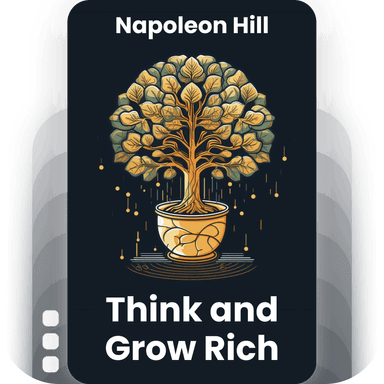
Leaders Eat Last
Simon Sinek
4.9 - 5 ratings
10
List Points
10
Chapters
5
Topics
Description
Simon Sinek's book delves into the fundamental principles of leadership, emphasizing that true leaders prioritize the well-being of their team over their own interests. By creating environments where people feel valued and protected, leaders can foster trust, cooperation, and a sense of belonging. Sinek combines real-world examples with scientific research to illustrate how human biology and psychology influence organizational culture, ultimately arguing that empathetic and selfless leadership leads to more successful and resilient organizations.
What will you learn?
In this insightful and compelling book, you will discover the essential principles of leadership that foster trust, cooperation, and mutual respect within organizations. Simon Sinek delves into the biological and anthropological underpinnings of leadership, explaining how creating a safe and supportive environment can inspire individuals to work together effectively and selflessly. By understanding the importance of putting the well-being of others first, you will learn how to cultivate a culture where people are motivated by shared values and a sense of belonging, ultimately leading to more sustainable success and fulfillment for everyone involved.
Who’s it for?
• Corporate leaders seeking to improve team cohesion and morale.
• Managers aiming to create a trust-based organizational culture.
• Entrepreneurs wanting to build inspiring and safe work environments.
• HR professionals focused on enhancing employee satisfaction and retention.
• Personal development enthusiasts interested in leadership principles.
Categories
Key Learning
Available chapters to listen for this topic- 1
The Circle of Safety
Understanding how leaders create a safe environment where team members trust each other and feel secure, fostering loyalty and cooperation within the organization. - 2
Endorphins, Dopamine, Serotonin, Oxytocin
Explore the roles of these key chemicals in driving human behavior and leadership effectiveness, emphasizing how they impact team dynamics and individual motivation. - 3
Empathy and Trust
Investigate the significance of empathy in leadership and how building trust among team members leads to higher morale, increased productivity, and collective problem solving. - 4
The Power of Belonging
Examine how fostering a strong sense of belonging within a team can lead to increased engagement, satisfaction, and performance, making employees feel valued and appreciated. - 5
The Influential Role of Leaders
Dive into the essential responsibilities of leaders in shaping a positive organizational culture through their actions, decisions, and ability to inspire and guide others. - 6
The Destructive Nature of Selfish Leadership
Understand the negative impacts of leadership driven by self-interest, focusing on how such behavior erodes trust, damages relationships, and hinders organizational success. - 7
Case Studies in Leadership
Analyze real-world examples of effective and ineffective leadership, learning lessons from both success stories and failures to enhance leadership practices and strategies. - 8
The Biological Drivers of Leadership
Discover the evolutionary basis of leadership behaviors and how understanding these biological drivers can improve leadership effectiveness and organizational harmony. - 9
The Importance of Long-Term Thinking
Highlight the benefits of adopting a long-term perspective in decision-making and leadership, encouraging sustainable growth, innovation, and resilience. - 10
Fostering a Culture of Cooperation
Strategies for creating a collaborative work environment where team members feel safe, supported, and motivated to contribute their best efforts towards common goals.
























